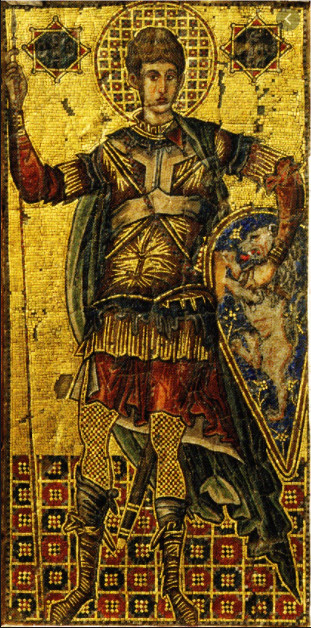
The excerpt quoted below is part of a far more extensive text by an
orthodox theologian on a number of topics, and was addressed as a letter
to an a-dogmatic Protestant.
Source: Η ΕΚΚΛΗΣΙΑ ΕΥΛΟΓΕΙ ΤΑ ΟΠΛΑ;
Orthodox Outlet for Dogmatic Enquiries (Translation: A.N.)
In Romans 13: 4, the apostle Paul mentions that “it is not proper for
the king to bear the sword, for he is a minister of God in wrath,
judging committed evil.” (=he does not carry a sword without reason, but
serves God, meting Justice upon the one who commits evil).
If
Paul says this about the pagan ruler and king, then, when the king is a
Christian (or should kings be excluded from baptism and salvation?) and
hordes of barbarians attack, should the Church pray for divine help to
the king or not?
If not - and more so if he enforces the
abolition of the army - then he is condemning the people to compulsory
martyrdom; however, martyrdom cannot be imposed compulsorily - not
everyone is ready to be slaughtered like lambs, and many will be those
who will grumble against God and thus lose their souls during the
onslaught of the enemy, just because they or their families perish.
It is no coincidence that the Church prays to God for victories only to
the king (“victories granted to kings, against barbarians” according to
the hymn), and not for victories of the army, because in Rom. 13:4, the
king 'does not bear the sword' (he does not carry his sword by chance)
and that when he uses it against the one committing evil, he is 'a
deacon of God'.
There is no ecclesiastic prayer for an army to
be victorious - not only in today's ecclesiastic books, but also in the
old ones, when the land was living in a time of war! The only relevant
prayer is '…for our Christ-loving army, let us pray'. Naturally,
soldiers cannot be excluded from the prayers of the Church; that is, to
be excommunicated and surrendered to the devil! (Needless to highlight
that those prayers only pertain to the ‘Christ-loving' army and as such a
philanthropic one, and not to any and every army).
Of course
there is no ecclesiastic prayer for the blessing of military arms
(whereas there are prayers, for example, for Easter eggs or the pie of
Saint Phanourios, e.a.). On the contrary, in every ecclesiastic ritual,
the first supplication is in favor of peace, followed by other prayers
on this subject. And then the Cross (through which we ask for
'victories to the kings') is characterized as 'a weapon of peace, an
invincible trophy'. This characterization meets the warlike similes in
the New Testament, such as Ephesians. 6: 11-17.

The holy 40 Martyr-saints who had disobeyed the emperor's commands,
albeit soldiers, and were condemned to martyrdom. I could say that
Christian Witnesses have been the most populous anti-authoritarian
movement in History. Their presence even to this day solves every
dilemma about how the words of the apostle Paul are applied faithfully,
and where the authority of every political ruler, king or other ends ...
Ecclesiastic rules regarding murder during war
Also dealing with killings during wars are two canons by Saint Basil the Great, ratified by the Quinisext Ecumenical Council:
Rule 8, 'On murder and murderers', includes those 'voluntarily killing' who murder during war attacks: '[…]
«Voluntary is also (considered) to be that which is (committed) wholly
and without any doubt; that is, attacks by robbers and by wars. For the
former kill for the sake of money (and also) avoiding controls, while
the latter that are in wars have come to murder; not to intimidate, nor
to reform, but to kill the opposing ones, openly displaying their
intention. […] ».
Consequently, these fall under Rule 56, for
those who voluntarily murder; that is, they are subject to
excommunication for twenty years: the first four to be standing outside
the church confessing their crime and asking for the prayers of the
Christians:
“The one who has murdered voluntarily and has
afterwards repented, let him be excommunicated from all sanctifications,
and twenty years of excommunication be imposed upon him. For four
years, he is obliged to stand tearfully outside the door of the house of
prayer, beseeching the prayers of the people entering therein, and
publicly declaring his transgressions. After the four years, he will be
accepted by those listening (to the church service), and in five years,
he can exit together with them. In seven years, he can exit, having
prayed together with the other attendees. In four years, he is
introduced only to the faithful, but not receiving any offerings. After
fulfilling all the above, he can partake of the sanctifications.»
Rule 13, «On those who have killed in wars» clearly refers to defensive
wars, hence writes: «The killings in wars our Fathers did not take
into account as murders; I think they were providing forgiveness, to
those who were defending sobriety and piety. Apparently, he did well to
advise that for having unclean hands, they should abstain only from
Communion for three years.»
Significant points here are: (a)
The saint mentions that those in the past (= the Church during the
persecutions, when Christian soldiers participated in wars, before the
supposed 'submission' of the Church to the state) had forgiven murder
during war. (b) But he also differentiates himself from those Fathers,
asking for three years of excommunication!! (c) Τhe Quinisext Council
validated this rule by Basil the Great and not the previous ecclesiastic
practice, despite the fact that it was conducted in a Christianized
state, whereas the ancient Church was outlawed, within an idolatrous
state.
The 66th Apostolic Canon defrocks the clergy and
excommunicates (cuts off from the divine Communion) the lay persons who
kill during war: “If any of the clergy strikes someone in a battle and
with one blow causes death, let him be expelled for his haste. And if it
be a lay person, let him be excommunicated». [According to an article
by Archimandrite Nicodemus Barousis, “Murder in war and our Priesthood”,
this Rule obstructs the recognition of martyred clergymen who had
committed murders in revolutions against the Turks – for example, the
recognition as martyr-saint of Bishop Isaiah of Salona, the priest
Ioannis (brother of the former) and of Athanasios the Deacon, were all
rejected by the Church of Greece].
According to the 5th Rule of
Saint Gregory of Nyssa, even the one who has killed someone
inadvertently is barred from the priesthood: «Even if inadvertently,
one becomes a miasma on account of murder, having rendered himself
desecrated by the sin, thus the Canon pertaining to hieratic grace deems
him rejected». «That is, whoever kills, even if hesitatingly and
involuntarily, if he be a layman will not become a priest, and if he be a
priest, is defrocked», as Saint Nicodemus comments in the “Pedalion”,
pp. 657-658.
And he then adds: «And generally speaking, all the
Clergy who might kill, either voluntarily or involuntarily, whether
with their own hands, or put others to kill, are defrocked, according to
the diagnosis of Constantine Chliarinos. (Balsamon also adds that he
had seen a priest be defrocked, because when grabbing his book from
someone, after arguing with another priest, the latter fainted because
of this hassle and died. Likewise he had seen another priest-monk also
defrocked, when, after an exchange of harsh words with another monk who
-unable to tolerate those words - had sighed heavily, and who,
immediately after that sigh, also promptly died. He had also seen, he
says, a High Priest deposed for having killed a Hagarene in a time of
war, “having re-wielded his sword against him”).
After all of the above, do you still insist that the Church “has no official view on bloody war”?
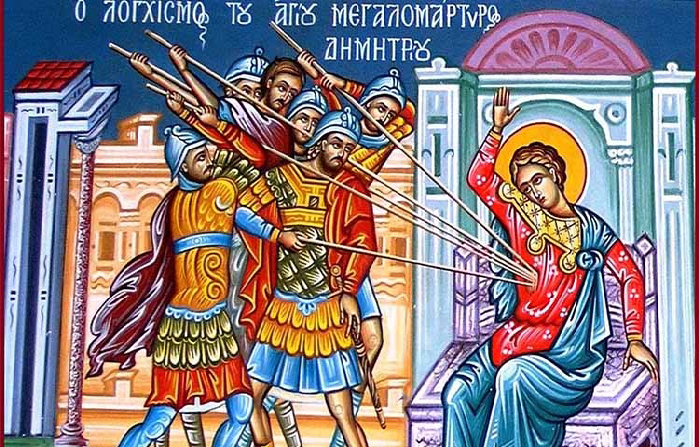
The spear-piercing martyrdom of Saint Demetrius.
As
a certain author has pointed out, military saints are always defeated
saints - and yet, they are the ones who have been recognized and honored
as saints - not the proud victors. They were victorious, through their
defeat.
The implementation in practice of the Church's view against war is evident in the Book of Saints:
A) Those who were killed in war against infidels are not honored as
martyrs and saints (Nicephoros Phokas had requested it, but the then
patriarch and the synod had rejected it, citing rule 13 of Basil the
Great); recognizing only those who were killed during various
persecutions without any war. (Some commentators, like Ms. Hélène
Ahrweiler, by judging with social and political (but not Christian)
criteria, puts blame on the Church for not recognizing the Emperor
Constantine Palaiologos as a saint).
B) The saints serving
in the military normally also become martyrs, inasmuch as they have
washed away the blood of the enemies (even if shed during defensive
wars) with their own blood. Even Nicephoros Phokas, who is a saint, had
died of a knife wound but is not honored for having liberated lands from
the harsh Arab occupation, but solely for his piety. He too died by a
knife, albeit in his marital bed and not on the 'glorious' battlefield!
Was it by chance?
C) In addition to the thousands of
martyrs during the persecutions, there are other saints who refused to
fight, having comprehended the viewpoint on war in their spiritual
heritage. Saint Boniface, the enlightener of the Germans, in 754 AD, had
refused to defend himself when he was attacked by barbarians in the
woods across the Rhine, and had simply covered his head with the
manuscript of the gospel.

The Russian saints, princes Boris and Gleb, in 1015, when their older
brother Sviatopolk invited them to his palace and they realized he
sought to murder them, went there anyway, and in fact within a month of
each other, considering it contrary to their Christian faith to put
their soldiers to fight for their sake.

In 452 AD, when Rome was besieged by Attila, the Pope - Saint Leo the
Great - averted the occupation of the city by going out to meet him
unarmed, in uniform, together with the priests of Rome. This act was
repeated by Pope Saint Gregory II (717-731 AD), preventing the
occupation of Rome by the Lombard king Liutprand.
What should a
Christian king do when his country and people are under attack? Abolish
the army (thus attracting the attacks of the barbarians) and impose
involuntary martyrdom on everyone, or to have an army to defend itself?
This dilemma is huge, and has a direct bearing on Rom.13:4 mentioned
above. Some holy kings tried to give a solution, based on their personal
thoughts. Are they perhaps “not saints” if the solution they had given
was wrong or misplaced? At any rate, they did what they believed most
befitted Christianity, even sacrificing their own lives and in defence
of their people:
 Saint Sigebert [icon],
king of East Anglia, in 637 AD, while under pressure, was forced to
lead his army into battle, after having abdicated the throne and become a
monk. So he came down unarmed, with only a stick, and of course was
killed. We do not know if he had prayed for his soldiers - that is, for
them to be forgiven for the enemies they would kill - or if he had come
unarmed, sacrificing himself for his soldiers.
Saint Sigebert [icon],
king of East Anglia, in 637 AD, while under pressure, was forced to
lead his army into battle, after having abdicated the throne and become a
monk. So he came down unarmed, with only a stick, and of course was
killed. We do not know if he had prayed for his soldiers - that is, for
them to be forgiven for the enemies they would kill - or if he had come
unarmed, sacrificing himself for his soldiers.
Saint Edmund, another King of England, in 869 following a desperate
resistance against the Viking invaders, surrendered his kingdom and
himself in order to stop the war and was killed by arrows, like St.
Sebastian, after refusing to renounce his Christian Faith. He was
immediately honored as a miracle-working saint, while some 10-20 years
later the Vikings minted coins dedicated to his memory!
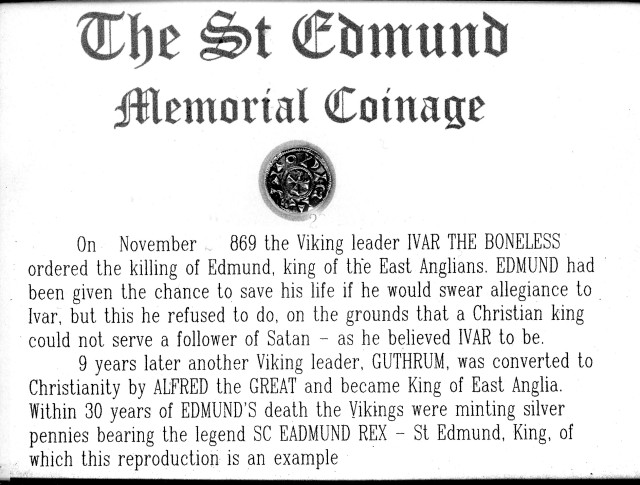
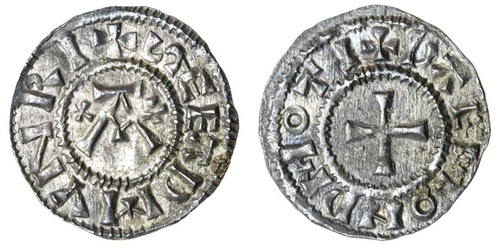
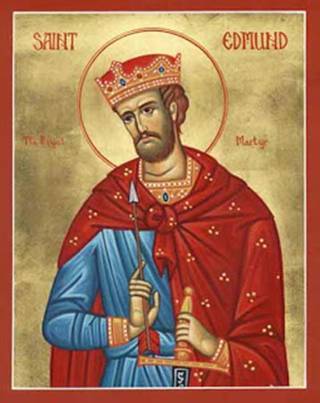
Holy Martyr-king Edmund, who sacrificed himself for his people. He is holding an arrow, because he was killed with arrows.

On June 15, 1389, Saint Lazarus, King of Serbia, with 35,000 soldiers,
fought against 100,000 Turks in Kosovo, in one of the most important
battles in (at least European) history. His biography says that, before
the battle, an angel of the Lord put him before the choice between the
earthly or the heavenly kingdom: he could immediately attack the Turks
and defeat them, or wait for the next day, for the army to attend the
divine Liturgy and receive Holy Communion, but be defeated. The saint
preferred the latter, choosing to send his soldiers to God equipped with
Holy Communion. He was captured and executed, and before being
beheaded, he prayed for the forgiveness of his sins and the salvation of
his people. Despite the terrible losses of the Turks, the defeated
Serbia became their vassal.
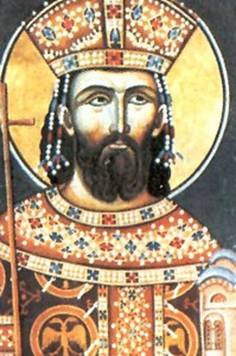
Even if we regard these miracles as myths (although they are no
different to biblical miracles), the fact that these people are orthodox
saints - that these DEFEATED kings were honored as saints – denotes
many things as regards the Church's views on war.
The notion
that a war for liberation is a holy war does actually exist among our
people and to some priests (privately), but such a thing has not been
established in any Ecumenical Synod, nor do I know if the Church Fathers
express such an opinion. However, biblically speaking, we cannot rule
out such a thing, since it is done for the benefit of the people and not
for reasons of sovereignty, when we always have Rom. 13: 4, according
to which “it is not proper for the king to bear the sword”.
Of
course, if we followed the Bible verbatim we could imagine that holy
wars do exist, which must be fought rabidly - according to the 4th
chapter of Joel; the fact that he talks there about the final War does
not change the fact that there are other wars “for the sake of God’s
people”: when for instance the pagan Turks or the heretical Latins
launch attacks. And yet, ecclesiastically, nothing has been spoken.
Glorifications sung during national holidays also praise God for His
granting of liberation (=as His own gift, not thanks our weapons), but
they do not highlight any victory over enemies, and even less, the
extermination of an enemy.
Strangely enough, although we
constantly voice praises in Church on the extermination of the Pharaoh
in the Red Sea - as a miraculous intervention by God of course – we
naturally utter no praises whatsoever for the extermination of the
barbarians who had attacked Byzantium, or for those who had enslaved our
nation, tormented us, killed us, burned our churches, pushed for a
change in our Faith etc.. We only thank God or the Holy Mother
Theotokos (with the hymn “To the Great Defender….”) for Her repulsion of
the invaders. Should we not thank Her? Wouldn’t David have sung thanks
when he defeated the Philistines?
The Church, by certain others,
is accused of abstaining from the National Struggles! Saint Athanasios
of Paros and Saint Cosmas of Aetolia had taught that the irreligious
conquering Turk was unknowingly the guardian of the Orthodox faith
against the lurking Franks; however, neither saint had ever incited the
populace to embark on an armed revolution, but only to a spiritual
awakening (through education and Orthodoxy). Were they truly traitors,
as accused by atheists and neo-pagans, or were they genuine Orthodox
Christians?
Δεν υπάρχουν σχόλια:
Δημοσίευση σχολίου